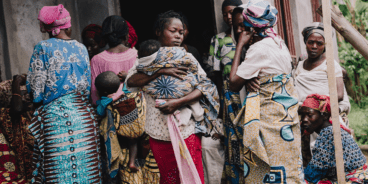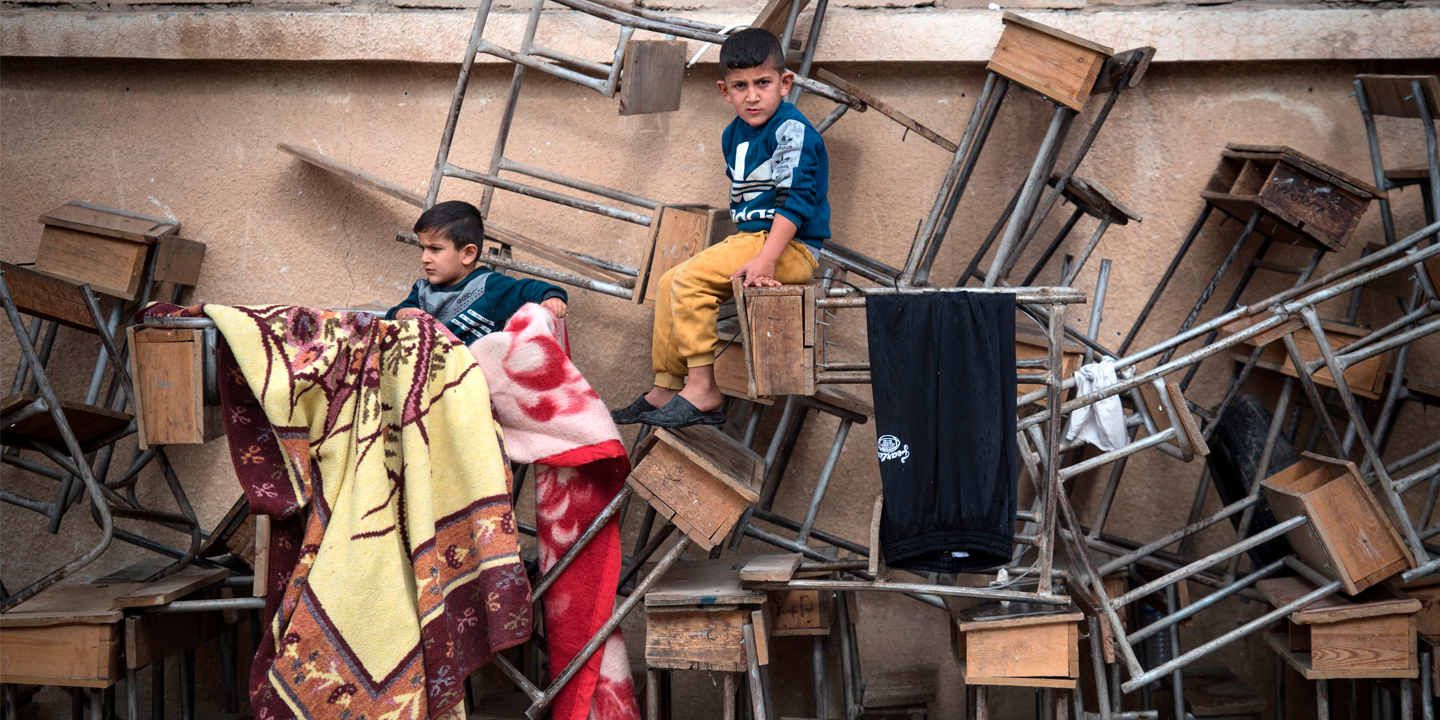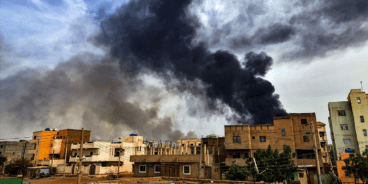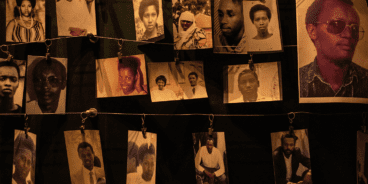

Atrocity Alert No. 208: Children and Armed Conflict, Nigeria and Libya
Atrocity Alert is a weekly publication by the Global Centre for the Responsibility to Protect highlighting situations where populations are at risk of, or are enduring, mass atrocity crimes.
UN Secretary-General documents violations against children but fails to list some major perpetrators
The UN Secretary-General’s annual report on children and armed conflict was released on Monday, 15 June, documenting more than 24,000 “grave violations” perpetrated against children. This included over 10,000 children who were killed or maimed across 19 different conflict zones during 2019. The report also documents 735 cases of sexual violence against children, over 7,000 cases of the recruitment and use of children in armed conflict, and nearly 500 attacks on schools.
The majority of these violations were perpetrated in countries where mass atrocities are ongoing or have recently been perpetrated. Afghanistan remained the deadliest conflict in the world for children, with at least 874 killed. An unprecedented number of child casualties (185 killed and 111 maimed) were also recorded in Mali, with 90 percent occurring in the Mopti region. Syria saw over 260 attacks on schools and hospitals, the highest in the world. Sexual violence against children was particularly prevalent in the Democratic Republic of the Congo, where the UN documented incidents affecting 249 girls. Half of these incidents were attributable to government forces.
Since the Monitoring and Reporting Mechanism (MRM) for children and armed conflict was established 15 years ago, the Secretary-General’s annual report and its annex have been useful in deterring grave violations against children. It is, therefore, deeply disappointing that a number of offending parties have been excluded or delisted from this year’s annexes.
The Saudi Arabia-led “Coalition to Support Legitimacy in Yemen” was removed from the “list of shame” this year, despite being deemed responsible for 222 child casualties. The report’s annexes also exclude Myanmar’s Armed Forces (responsible for child recruitment), US-led international forces in Afghanistan (responsible for almost 250 child casualties), and Israel’s armed forces (responsible for over 1,500 child casualties).
In response, Kevin Watkins, CEO of Save the Children, said, “It’s shocking that the Secretary-General failed to hold parties to conflicts all over the world to the same standards and levels of scrutiny… showing that once again the UN Secretary-General has placed politics before children, letting parties with powerful friends get away with destroying children’s lives with impunity.”
All perpetrators of grave violations against children must be held to the same standard, regardless of whether they are state forces or non-state armed groups. The UN Security Council is due to hold an open debate on children and armed conflict on 23 June. Council members should insist on a single, complete list of perpetrators that accurately reflects the data collected and verified by the MRM.
In order to better protect children in armed conflict, all UN member states should implement the Optional Protocol to the Convention on the Rights of the Child, the Paris Principles, and the Vancouver Principles, and abide by the Safe Schools Declaration.
Boko Haram attacks civilians and exacerbates Nigeria’s COVID-19 crisis
There have been over 17,000 confirmed cases of COVID-19 in Nigeria, where the federal government is struggling to curb the pandemic. Meanwhile the armed extremist group Boko Haram and its offshoot, the Islamic State in West Africa (ISWA), are exploiting the COVID-19 outbreak to expand their activities. Both armed groups have undermined the public health response by increasing their attacks and are also spreading misinformation regarding the virus.
On 9 June alleged Boko Haram fighters attacked the village of Faduma Koloram in Borno State, killing at least 81 residents. During the attack seven people were abducted and 1,200 cattle were stolen. The village was reportedly attacked because residents were accused of sharing information with the Nigerian security forces.
On 13 June two attacks took place on Goni Usmanti and Monguno – a town where the UN and several international humanitarian organizations have bases. The attacks resulted in at least 20 soldiers and more than 40 civilians being killed. On Monday, 15 June, the UN Humanitarian Coordinator in Nigeria, Edward Kallon, “vehemently condemned” the violence and said that he was “shocked by the intensity of this attack. It is the latest of too many clashes affecting civilians, humanitarian actors and the assistance we provide.”
Despite the Nigerian government making significant progress against Boko Haram and ISWA since 2015, both groups have intensified their attacks in recent months and at least 2.5 million people remain internally displaced in the north-east of the country. During April the International Organization for Migration warned that an outbreak of COVID-19 could have “devastating consequences” for north-east Nigeria, where more than a third of health facilities have been destroyed by past attacks.
The Nigerian government should continue to support programs that strengthen local security, counter violent extremism, and bolster the rule of law in areas where Boko Haram operates. The Nigerian government should also request increased international assistance to protect vulnerable populations and defend health care workers and facilities.
War crimes continue as mass graves are discovered in Libya
On 11 June the UN Support Mission in Libya (UNSMIL) announced its “horror” at the discovery of eight mass graves in Tarhuna, the former western stronghold of Khalifa Haftar, self-declared Field Marshal of the Libyan Arab Armed Forces (LAAF) and al-Kaniyat, an affiliated militia. Initial reports indicate that while some of the victims were executed, others were possibly buried alive. Charred bodies were also discovered in shipping containers elsewhere in the town. Investigations are ongoing, but officials from the UN-recognized Government of National Accord (GNA) stated that there were “dozens” of victims.
UN Secretary-General António Guterres and UNSMIL have called for “thorough and transparent investigations” of the mass graves, containers and other sites in accordance with international law. UNSMIL also welcomed the decision by the GNA’s Justice Minister to establish an investigative committee.
The mass graves were discovered following intense fighting that effectively ended Haftar’s 14-month campaign to capture Tripoli and overthrow the GNA. Since 5 June over 24,000 people have been displaced. Despite Haftar’s forces now being in retreat, fighting continues.
Armed groups in Libya have violated international humanitarian and human rights law since the latest conflict began in 2014. The International Criminal Court (ICC) has issued two arrest warrants for Mahmoud al-Werfalli, an LAAF commander, for war crimes allegedly committed between June 2016 and January 2018.
Various foreign powers, including permanent members of the UN Security Council (UNSC), have provided arms and support to parties to the conflict, including Haftar’s LAAF, despite a UN-mandated arms embargo. Sarah Hunter, Communications and Digital Media Officer at the Global Centre for the Responsibility to Protect, said that, “These mass graves are just the latest in a long line of atrocities endured by the Libyan people. The international community must ensure that impunity ends now and the perpetrators of these heinous acts are held accountable.”
Under the terms of UNSC Resolution 1970 (2011), the ICC may exercise jurisdiction over any mass atrocity crimes committed in Libya from February 2011 onwards. There have also been recent calls for the UN Human Rights Council to establish a Commission of Inquiry to investigate and provide evidence to various judicial mechanisms. The UNSC should impose targeted sanctions on all individuals and forces – both domestic and foreign – who continue to actively subvert the Libyan peace process and are attempting to overthrow the UN-recognized government.
Related Content


Atrocity Alert No. 390: Sudan, Myanmar (Burma) and the UN Human Rights Council
